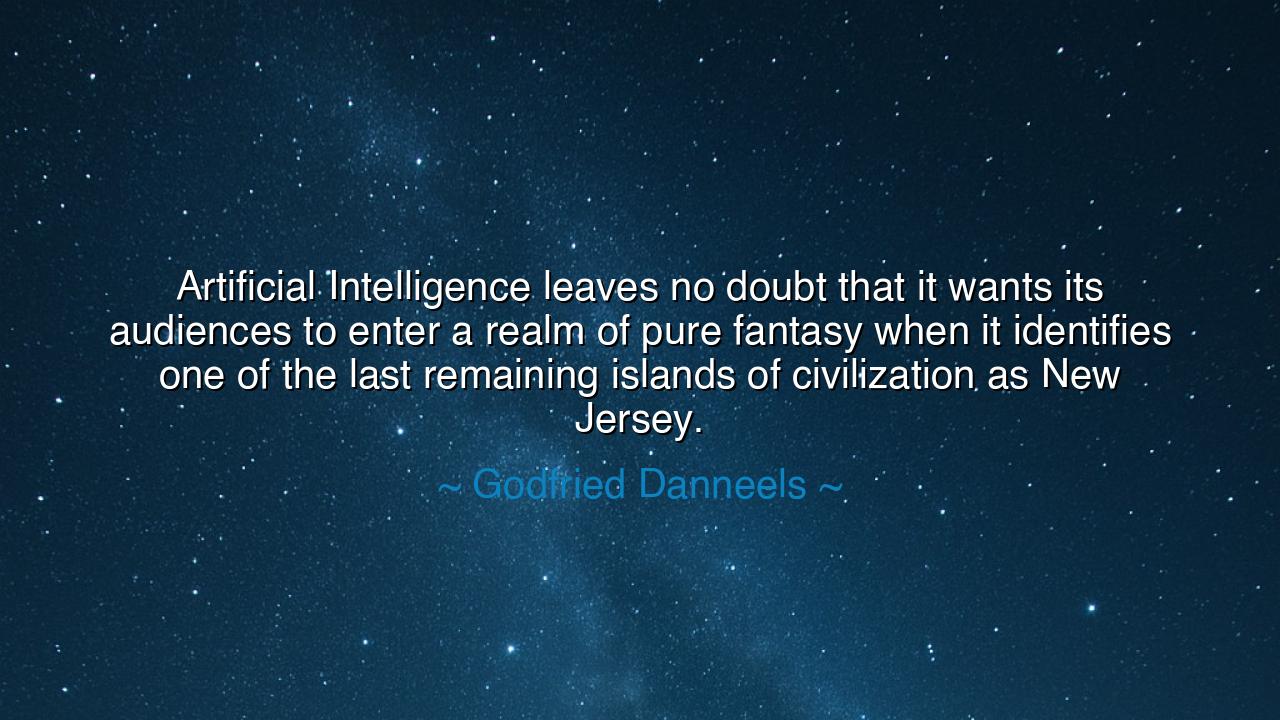
Artificial Intelligence leaves no doubt that it wants its
Artificial Intelligence leaves no doubt that it wants its audiences to enter a realm of pure fantasy when it identifies one of the last remaining islands of civilization as New Jersey.






In the ever-evolving landscape of technology, where the boundaries between reality and illusion grow increasingly blurred, the words of Godfried Danneels, “Artificial Intelligence leaves no doubt that it wants its audiences to enter a realm of pure fantasy when it identifies one of the last remaining islands of civilization as New Jersey,” beckon us to pause and reflect. Danneels’s statement is not merely a critique of artificial intelligence but a profound commentary on how technology, in its pursuit of the futuristic, often distorts our understanding of the world we inhabit. By juxtaposing the imaginary realm of artificial intelligence with a place like New Jersey, traditionally seen as a hub of industry and human endeavor, Danneels invites us to question how technology reshapes our perception of the real world and whether we have lost touch with the authentic meaning of civilization itself.
In the ancient world, the philosophers often sought to separate the illusions of the material world from the deeper truths that could be grasped through wisdom and understanding. The great Plato, in his work The Republic, spoke of the cave allegory, where prisoners, confined in darkness, could only see shadows cast on the wall and believed those shadows to be the only truth. Similarly, Danneels is pointing to a society where the real world, represented by places like New Jersey, is overshadowed by the false projections created by artificial constructs, which distract us from true civilization. Plato’s caution about the illusion of reality rings true in the age of AI: we are in danger of losing touch with the true essence of our humanity by allowing artificial constructs to shape our perception of the world.
In the Middle Ages, the concept of reality and fantasy was often a matter of great debate. Think of Thomas Aquinas, whose scholarly work sought to reconcile faith with reason. For Aquinas, the world of the spirit and the world of matter were in constant dialogue, and it was through reason that one could discern the truth of the divine amidst the distractions of earthly life. However, in today’s age of artificial intelligence, we are faced with a new dilemma: how do we differentiate between reality and the fantasy created by technology? AI, as Danneels suggests, has begun to blur those lines, drawing us into a world of illusion where even the most grounded and familiar places, like New Jersey, are reduced to mere concepts within a fantasy world that no longer reflects the true fabric of society.
This idea can be further understood through the rise of the digital age and the creation of virtual worlds. Consider the story of Mark Zuckerberg and his creation of Facebook, now part of the broader vision of the Metaverse—a virtual realm where reality and digital interactions become indistinguishable. Zuckerberg’s vision is compelling, yet it raises questions similar to those in Danneels’ critique: when we are absorbed into these digital spaces, are we truly engaging with civilization? Or are we instead retreating into an artificial version of life that diminishes the real connections and rich experiences that define our humanity? Like the artificial world of the Metaverse, AI may offer a convenient and engaging alternative to real life, but it can also obscure the truths that make us human.
Moreover, the comparison of New Jersey—a state with its own unique history, diverse culture, and human effort—to a fantasy realm reveals a deeper irony: the very essence of civilization is often found in the ordinary, the grounded, and the tangible. In the ancient world, Rome was not celebrated for its grand illusions, but for its innovations, its organization, and its ability to foster a diverse and thriving society. Likewise, New Jersey, with its mix of industry, culture, and history, represents a real civilization grounded in the hard work and vision of its people. To reduce this place to an imaginary realm is to lose sight of the true foundations of what makes a society thrive.
The lesson from Danneels’ words is an urgent one: as we move deeper into an age shaped by technology, we must be vigilant not to lose our connection to the real world. Just as Plato cautioned his followers against confusing shadows for reality, we must be wary of digital illusions that draw us away from the richness of our actual lives. Technology, particularly artificial intelligence, has the power to enrich our world, but it must not replace the genuine connections, the hard work, and the shared experiences that form the heart of human civilization. In every realm—whether in New Jersey or any other part of the world—we must ensure that our dreams and visions are rooted in the real, in the authentic, and in the enduring qualities of what it means to be human.
In your own life, reflect on the balance between technology and reality. How often do you find yourself swept away by the digital illusions of the world? Are you still deeply connected to the real, the tangible, the community around you? Just as Danneels suggests, we must nurture our dreams and our vision for the future, but never let them pull us into a fantasy that forgets the true essence of human civilization. Seek to engage with the world around you, build genuine connections, and find ways to foster growth in the real rather than retreating into an artificial realm where the essence of humanity can be lost. In this way, we can ensure that we are creating a future that honors the real world while embracing the potential of technology.






AAdministratorAdministrator
Welcome, honored guests. Please leave a comment, we will respond soon